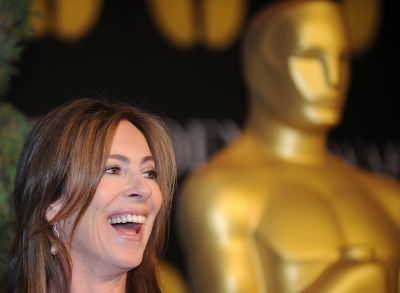Women directors face 'celluloid ceiling'

Your support helps us to tell the story
From reproductive rights to climate change to Big Tech, The Independent is on the ground when the story is developing. Whether it's investigating the financials of Elon Musk's pro-Trump PAC or producing our latest documentary, 'The A Word', which shines a light on the American women fighting for reproductive rights, we know how important it is to parse out the facts from the messaging.
At such a critical moment in US history, we need reporters on the ground. Your donation allows us to keep sending journalists to speak to both sides of the story.
The Independent is trusted by Americans across the entire political spectrum. And unlike many other quality news outlets, we choose not to lock Americans out of our reporting and analysis with paywalls. We believe quality journalism should be available to everyone, paid for by those who can afford it.
Your support makes all the difference.Kathryn Bigelow will make Oscars history here Sunday if she becomes the first woman filmmaker to be crowned best director in the 82-year history of the Academy Awards.
But Bigelow's expected victory for her Iraq War drama "The Hurt Locker" masks a startling gender imbalance within the movie industry that researchers have dubbed the "Celluloid Ceiling."
Bigelow, 58, is one of only four women to be nominated for the best director prize, following Lina Wertmüller for "Seven Beauties" in 1976, Jane Campion for "The Piano" in 1993; and Sofia Coppola for "Lost in Translation" in 2003.
The paucity of female filmmakers to earn recognition at the Oscars reflects an industry-wide trend, according to Martha Lauzen, head of the Center for the Study of Women In Television and Film at San Diego State University.
Lauzen's annual report on women in the movie industry recently revealed that of the top 250 highest grossing films in North America in 2009, only seven percent were directed by women, a drop of two percent from a year earlier.
The imbalance is also reflected in other areas of the movie business. In 2009 only eight percent of credited writers on the top 250 films were female.
Lauzen says much of Hollywood is in denial about the issue of women in film.
"One of the reasons is that there is a lot of denial regarding women's current place in the movie business," she told AFP.
"I've heard editors of major trade publications as well as the heads of studios simply say there is no problem.
"They'll either say no celluloid ceiling exists or they'll rattle off four or five names of high profile directors who happen to be women and then with a shrug say 'See - there's no problem.' Well that's incredibly misleading.

Watch Apple TV+ free for 7 days
New subscribers only. £8.99/mo. after free trial. Plan auto-renews until cancelled

Watch Apple TV+ free for 7 days
New subscribers only. £8.99/mo. after free trial. Plan auto-renews until cancelled
"Just because you can name four or five women directors doesn't mean no problem exists. If you don't think there's any problem then you're not going to be looking for a solution. And that perpetuates the status quo."
Lauzen is cautious about what Bigelow's likely success on Sunday will mean. "I think it will give a lot of attention to the issue in the short term, which is welcome," she said. "But we have to have realistic expectations of what the very well-deserved accomplishments of a single woman mean.
"Attitudes about gender are very entrenched and when they change they change very slowly. So I think this could go down a couple of different ways.
"If Kathryn Bigelow wins, media stories could talk about how everything has changed now and that women are equal. And that would be unfortunate."
Bigelow, who has already made history this year by becoming the first woman to win the Directors Guild of America's top honor, has downplayed the significance of her gender during the award season campaign trail.
However after claiming the directing prize at the BAFTA awards in London last month - again the first woman to do so - she referred to the "constant struggle" faced by women in the industry.
" ... so if this can be a beacon of light, then, wonderful," she said.
Ironically, Bigelow has forged her reputation through a series of films notable for their overt masculinity, whether it's the slick 1991 action film "Point Break," the tense Cold War-era nuclear submarine drama "K-19: The Widowmaker" or her nail-biting Oscar contender "The Hurt Locker."
Jeremy Renner, the Oscar-nominated star of "The Hurt Locker," scoffed at suggestions that Bigelow's apparent preference for testosterone-fueled movies was unusual.
"What does having a set of ovaries have to do with directing a film?" Renner told CBS television's 60 Minutes. "It's through her eyes that she sees, not through her mammaries or anything else."
Bigelow's ex-husband James Cameron, who is nominated for best director for his science fiction blockbuster "Avatar," said he believed his former spouse was fascinated by "war and conflict."
"I think she also takes pride in the fact that she can out-gun the guys - that just in terms of pure technique, pure game, she's got more game than most of the male directors out there," Cameron said.
Join our commenting forum
Join thought-provoking conversations, follow other Independent readers and see their replies
Comments